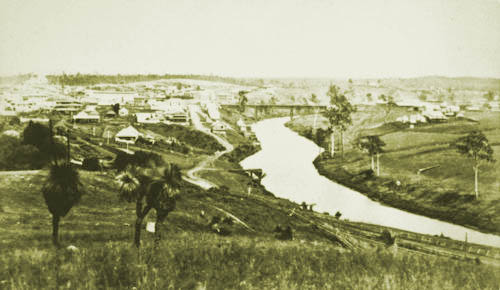Like most towns in colonial Queensland, Ipswich was largely made up of
timber structures and was therefore extremely vulnerable to fire. Added to this, few towns had fire brigades and,
such fire “engines” that existed, were limited to ladders, hand pumps, and
buckets.
 |
| A well-equipped Colonial fire-engine |
The Great Fire of Ipswich broke out just after midnight in Brisbane
Street on a night in February 1861. A
reporter from the North Australian
(the fore runner of the Queensland Times)
was on the spot.[1] The flowery nature of his prose of the time
makes the report sound almost flippant.
The Fire Bell is now pealing forth its dolorous sound,
one which has not been heard for many, many months in Ipswich. Upon proceeding
to the spot, from whence a large column of flame was shooting high into the
heavens, we found the shop of Lang, bookmaker, of Brisbane-street one mass of
flame.
 |
| Report in the North Australian |
It is needless to point out to those acquainted with
Ipswich, the match box character of that and the principle number of the
adjacent buildings: Mr. Bulcock’s, fruiterer, Mr. Given’s, jeweller, Mr. Hughes
confectioner, Mr. Challinor’s, photographist, and innumerable small buildings
in the rear were immediately one mass of flame, thus extending a considerable
distance along Brisbane and rounding into Nicholas-street.
The boys on night shift at the Newspaper rallied to the fight.
Attempts were made, and in several cases successfully, to
save property, and a large quantity of valuable jewellery, watches &c.,
were wrested from the flames, from the establishment of Mr. Given’s, and
conveyed to the Post Office which Mr. Gill kindly opened for their reception.
The young men of the North Australian being on night duty were this first at
Mr. Given’s, gave the alarm, and saved the larger portion of his property.
By 1:30am several buildings were destroyed at the fire was still
raging. The citizens of Ipswich set to removing
materials from the path of the flames. Dating from Roman times and used during
the Great Fire of London in 1666, the standard method of dealing with a large
town fire was to tear down the buildings in its path and thus create fire
breaks.
 |
| Brisbane Street looking towards Limestone Hill, 1890s. |
The fire is still fiercely raging; the houses above
alluded to have been reduced by the flames into heaps of glowing ashes. In
Challinor’s and Hanran’s North Star Hotel; the latter being a brick house, the
shingles from the roof are quickly falling beneath the axe. In Nicholas-street,
the houses adjacent to Mr. Given’s, which were separated by a garden, have just
ignited at the southern end, but vigorous attempts are being made to level with
the earth, and remove from the passage of the flames, the materials of the untouched tenements.
On the corner of Brisbane and Ellenborough Streets, The north Star
Hotel was saved. The hero of the piece
was brave soul dubbed Garribaldi’ who bravely stayed at his post on the hotel
roof.[2]
It is almost a miracle how the flames did not set the
North Star Hotel on fire. There is only an interval of some eight or nine feet between
it and Mr. Challinor's house. A number of blankets were laid on the shingle
roof of the hotel, and half a dozen men kept pouring water on; but, had it not
been for their exertions, the building would certainly have been destroyed.
 |
| Ipswich from Limestone Hill, 1870s |
There was one man in particular, named Elias B. Cayzer, who stuck to his post
on the roof whilst the spectators were driven back across the whole breadth of
the street by the heat. "Garibaldi," or "Salamander," [3] as
the bystanders christened him, for the want of his real name, remained on the
roof till the last, although his comrades had to be frequently relieved, for no
ordinary amount of human endurance could have withstood the fierce heat.
 |
| Report in the North Australian |
The bard-like reporter from the North
Australian summed up the mood of the citizenry of Ipswich in the fire’s aftermath.[4]
There we must pause. After the destruction of thousands
of pounds of property, people looked into each other’s faces and enquired:-
“Where is our Engine? Where is our Fire Brigade?”
And Echo[5]
answered, derisively: – “Where?‘‘
© K. C. Sbeghen, 2011.
[2]
The Courier
23.2.1863
[3]Numerous legends have developed around the salamander over the centuries, many related to fire. This connection likely originates from the tendency of many salamanders to dwell inside rotting logs. When placed into a fire, the salamander would attempt to escape from the log, lending to the belief that salamanders were created from flames — a belief that gave the creature its name.(Wikipedia)
[4] The North Australian 21.2.1863
[5] In
Greek mythology, Echo was a mountain nymph who loved her own voice.


















